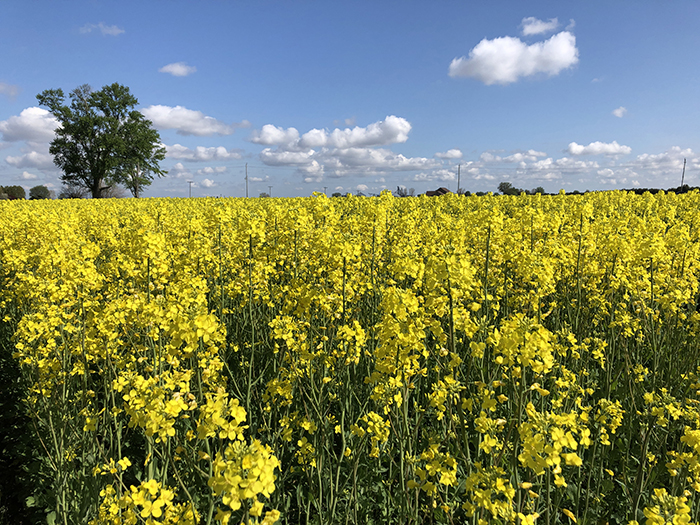
By Pam Wright
Local Journalism Initiative Reporter
An aesthetically pleasing crop that’s also environmentally friendly is taking root in Chatham-Kent.
About 4,000 acres of winter canola – an oilseed that’s gaining in popularity – is being grown in Ontario.
Near Tupperville, farmer Brian Eves is growing winter canola for the second year, experimenting with the oilseed.
“It’s very much non-GMO and a good crop to add to the rotation,” Eves told The Voice in a recent interview. “Canola is such a competitive crop, it will choke out everything else.
“That’s one of the reasons I’m interested,” he said. “It doesn’t need other stuff.”
The environmental advantages of canola are many. The full canopy of bright yellow blooms shades out other plants, thereby reducing the amount of glyphosate needed to control weeds.
Only one application is needed and it’s made prior to planting.
Eves planted the tiny seeds with a grain drill and will harvest it using a conventional combine.
Eves said the crop has the added advantage of being a “tremendous benefit” to insects and birds, and canola honey is some of the best around.
Meghan Moran, canola and dry bean specialist with OMAFRA, said newer genetics developed by Agri-Food specialist Dr. Eric Page at Harrow have enabled winter canola to be viable.
Moran said the crop needs to be planted earlier than winter wheat as it derives its cold-weather energy from the root system, rather than the seed.
The extensive root system breaks up the soil as well, Moran said, another advantage to growers.
She thinks winter canola is a good crop, adding many farmers are expressing interest.
“Growers are having a lot of success,” she said, adding yields are strong and demand for the plant that is similar to wild mustard is heavy.
There are two crush plants in Ontario – one in Windsor and another in Hamilton – that extract the oil.
The remaining ‘meal’ is used for livestock feed or food additives.
Moran said the price of canola has doubled in the past year, making it even more attractive.
The majority of canola that’s crushed in Ontario is shipped from Western Canada where the oilseed is one of the major cash crops.
Growers are doing well with canola in Chatham-Kent, Moran said, with a grower near Blenheim winning a 2020 provincial competition for highest yield.






